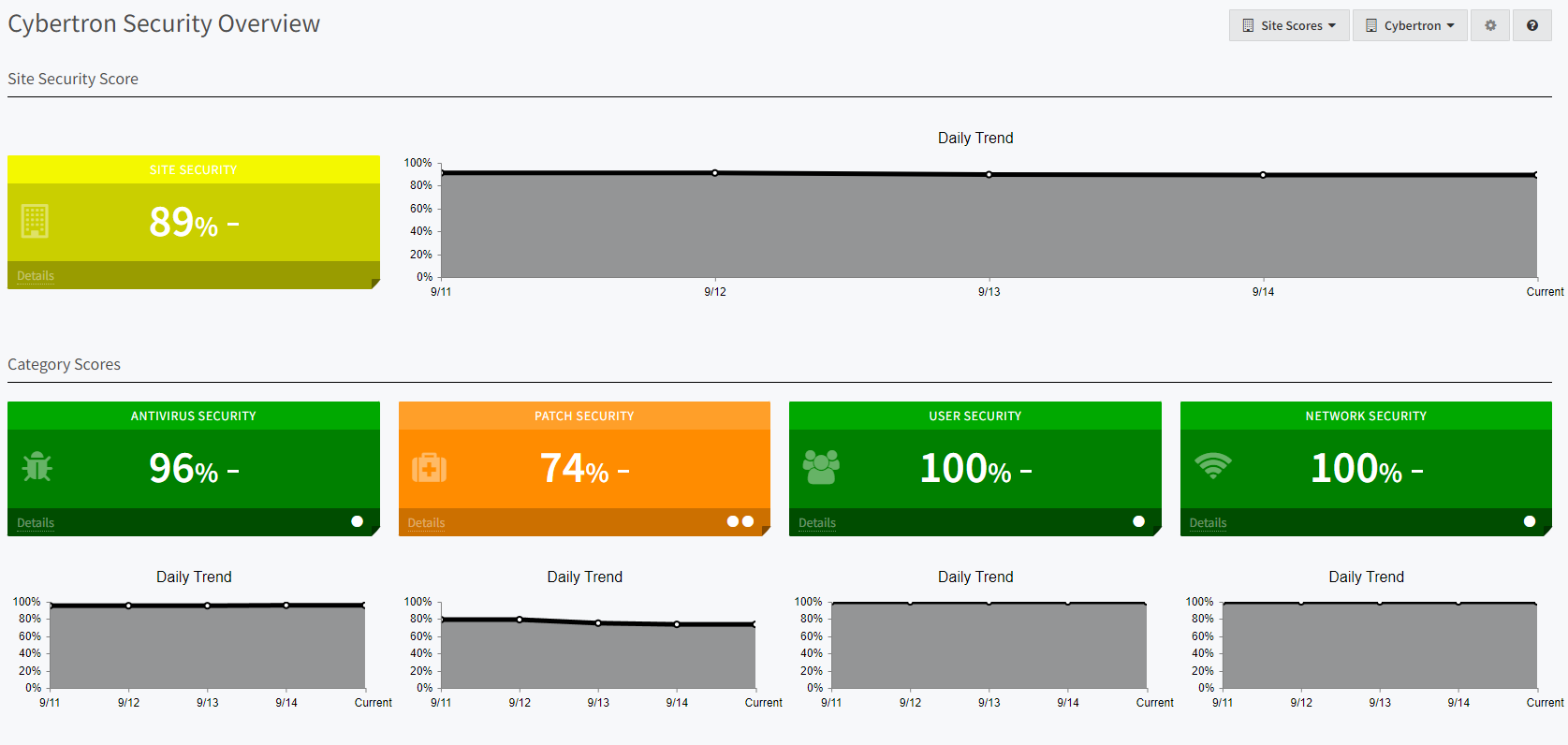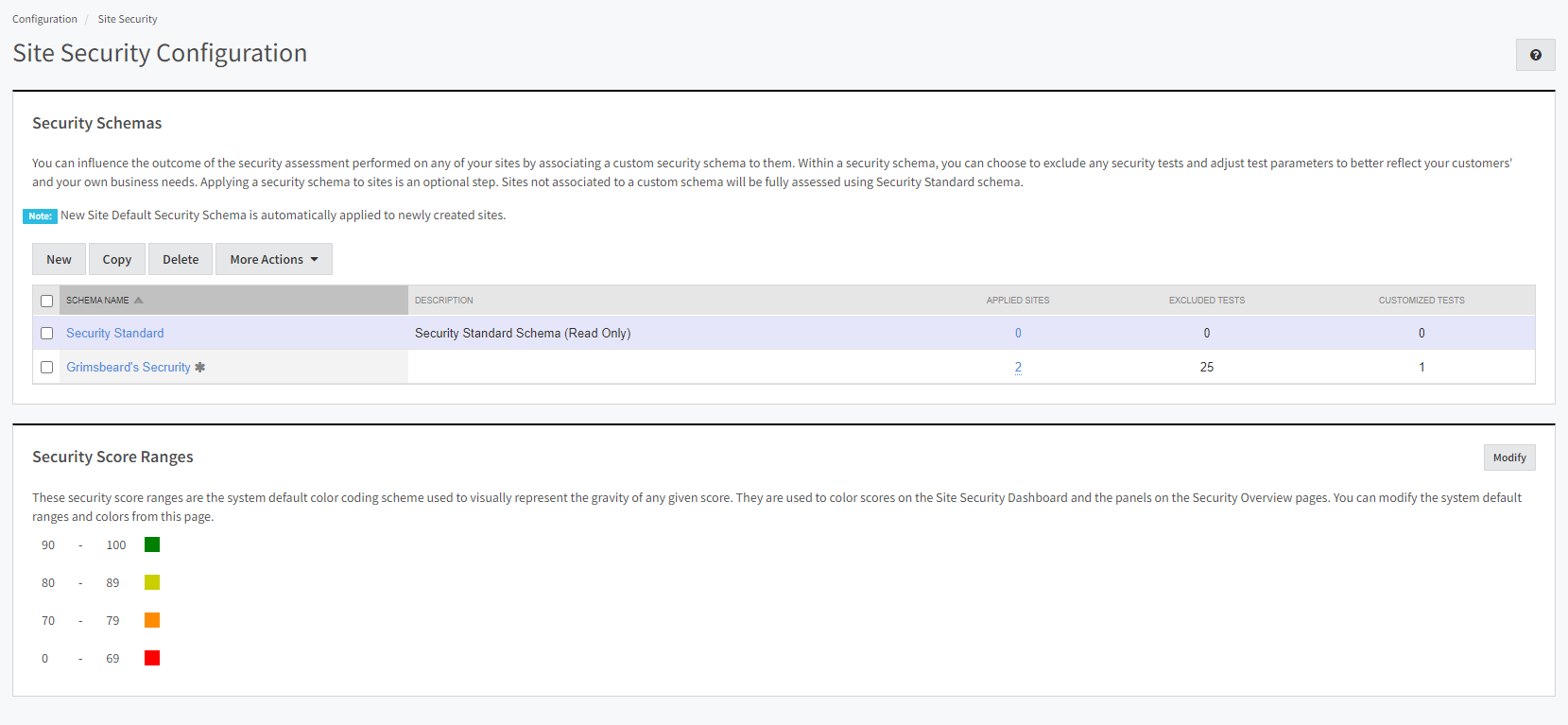In Barracuda RMM, you can access the Site Security Dashboard to get an overview of Antivirus Security, Patching Security, User Security and Network Security. Please see the below image of an environment from one of our support team staff members.
To access your Site Security Dashboard
- Click on Dashboards
- Select Site Security Dashboard
- The following is an overview of all sites with a Site Security Schema applied

- Click the hotlink of a Site Name to open up an expanded view

About Site Security Schemas
The data collected here come from a Site Security Schema and will provide a breakdown of issues on a given site to which the schema is applied. The Site Security Schema you can use for an overall glance at issues, but it needs to be fine-tuned for your needs/site. However, out of the box, you will have a default Security Standard that you can apply to sites as a demonstration. It is worth noting that this default schema has all options turned off and will include all tests, which is not ideal for sites and environments long term. You will want to create your schema. As Barracuda RMM collects data about devices scanned into the dashboard overall, the schema will help you determine what issues might be associated with Antivirus, Patching Security (both Windows and Third Party), User Security and Network Security. This will be displayed on the Site Security Dashboard, which is intended to get an accumulated overview of your sites so you may use Barracuda RMM to help mitigate and address any issues.
Accessing Site Security Schemas
- Click on Configuration
- Select Site Security
- You will have this page (or similar to this page)

Creating a New Custom Site Security Schema
- From the above steps, click on New
- Give the Schema a Name and description
- Each drop-down for Antivirus Security, Patch Security, User Security, and Network Security contains options to toggle
- Select which options you want to turn off, as all are on by default
- It is worth noting on the right-hand side, you can ungroup the test names to view all tests in one single pane
- Add a Site to the Schema (you may have more than one site per schema, but to tailor the needs, it is recommended to set up their schemas as need be)
- Hit Save
About Patching Security Score
A frequent request to the Barracuda RMM Support team is to understand the Patching Security Score within the Site Security Dashboard. The critical factor to consider is that the Patching Security Score is not represented as patches missing from a device according to Patch Management, but rather what the device is reporting is missing according to its inventory. Patch management is thus designed to work on updating those devices so that the Site Security Dashboard can adequately reflect. However, one of the main issues is that the Site Security Dashboard does not represent which patches are missing on which devices, only that devices report that they are missing patches. We are working with our development team to implement a change to list missing patches.
Another quick note on missing patches: often, we will see both Updates Rollups (which contain language packs), Office patches and patches not offered by WSUS factoring into patch security scores. The Barracuda RMM team recommends disabling the update rollups from the Site Security Schema as a best practice, as each language pack counts in the tabulation of the score rather than simply what your device uses. Equally, for Office patches, as there is no WSUS offering for those, We have an article on Patching Stand-alone MS Office and Office 365 that links to Microsoft's write-up. Finally, if you come across a patch that is not found in Patch Management, it is likely unavailable via WSUS. If a patch is not in WSUS, it is not automatically paginated in Patch Management. By searching the Microsoft Support site, you can determine whether a patch is available for WSUS. You need the patch's KB number or the patch's name.
How do I find out what patches are missing from devices?
In the past, partners would need to contact the Barracuda RMM Support Team to export a list of missing patches across all devices. However, we have incorporated the ability for partners to export this list on their own by doing the following:
- Expand Dashboards
- Select Site Security Dashboard
- Then click on the Site Name
- Select the Details of the Patch Security Score
- Click on More Details
- On the top right, just under the trend graph, select Export Patch Details, and it will download an Excel file of missing patches
- To apply said patches, you can use the above steps in About Patching Security Score
A Final Note on the Site Security Dashboard
Now that you have the Site Security Schema set up, the Site Security Dashboard will accumulate data over several days and update throughout the week. It is important to note that this dashboard is not a real-time tool but a weekly snapshot of many data points compiled in one location. It is also crucial to mention that if you see lower scores than you would like, it is essential to use Barracuda RMM (or other tools) to make adjustments and deploy fixes. The Site Security Dashboard looks at your environment, sites and devices without factoring in how you have those set up in Barracuda RMM.
